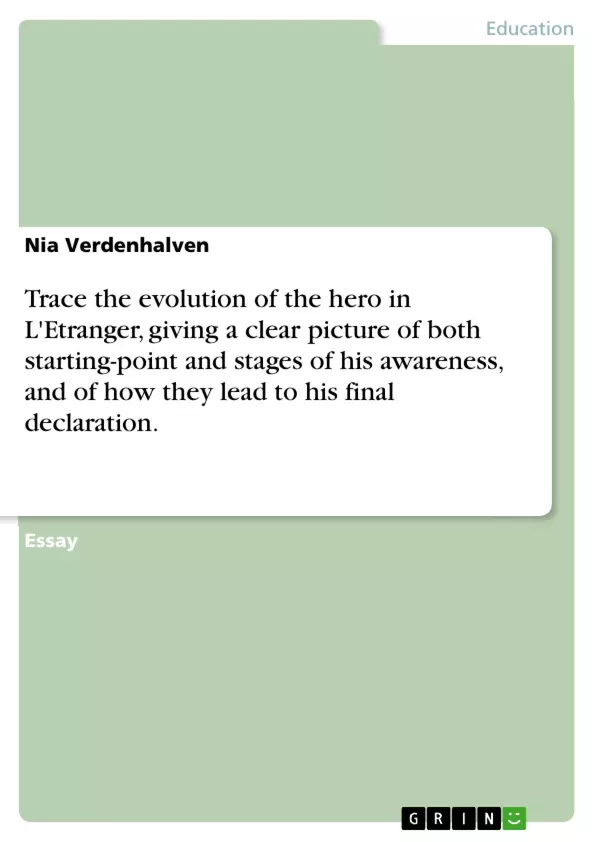Soon after L’Etranger was first published in 1942 it became a major success and it is now regarded as a twentieth-century classic. Since then numerous attempts have been made to analyse the fascinating but unsettling story of the main character, Meursault, in order to find explanations for his motives and actions. This essay will try to demonstrate that there are three main parts in this diary-style novel, in which death plays a key role. Beginning with the moment when carefree and indifferent Meursault learns about the death of his mother, followed by the fateful day when he kills the Arab, and eventually leading to his growing awareness and passion for life through confrontation of his oncoming execution.
Table of Contents
- The outgoing-point of the novel
- The murder of the Arab
- Meursault's awareness
Objectives and Key Themes
This essay aims to trace the evolution of the hero, Meursault, in Albert Camus's L'Etranger. By examining his starting point, the stages of his awareness, and the factors leading to his final declaration, the essay seeks to understand the complexities of Meursault's character and his relationship with society.
- Meursault's initial indifference and its implications
- The impact of the murder of the Arab on Meursault's life and awareness
- Meursault's growing awareness of himself, society, and the concept of freedom
- The role of death in shaping Meursault's perspective
- Meursault's final declaration and its meaning
Chapter Summaries
- The first chapter introduces Meursault, a seemingly indifferent man who receives news of his mother's death. His lack of emotional response leads to an examination of his relationship with society and his unique perception of life and death. Despite his unconventional behavior, he appears to be aware of social expectations while choosing to live in the present moment.
- The second chapter focuses on the pivotal event of the novel: the murder of the Arab. Meursault's action disrupts his usual carefree lifestyle and sets in motion a series of consequences that force him to confront the realities of his actions and the judgment of society.
- The third chapter delves into Meursault's imprisonment and the development of his awareness. Through interactions with others and reflection on his past, he begins to understand his new reality and the constraints of his newfound situation. This stage marks a significant shift in Meursault's perception of life and his own place within it.
Keywords
The essay focuses on themes of alienation, social expectations, the absurd, existentialism, freedom, death, and the individual's relationship with society. It examines Meursault's transformation from a seemingly indifferent man to a character who grapples with the complexities of life and death, ultimately finding meaning in his own existence. The analysis of Meursault's actions and motivations contributes to a deeper understanding of Camus's philosophical ideas and their application to human experience.
Frequently Asked Questions
How does Meursault's character evolve in L'Etranger?
Meursault evolves from a state of total indifference and sensory living to a state of heightened awareness and passion for life, triggered by his confrontation with death and execution.
What role does death play in the novel?
Death is the central catalyst: the death of his mother sets the stage, the murder of the Arab creates the conflict, and his own impending death leads to his final philosophical awakening.
Is Meursault truly indifferent to his mother's death?
Meursault appears indifferent to social conventions of mourning, but his behavior reflects his focus on the immediate present and physical sensations rather than emotional performance.
What is the significance of the murder of the Arab?
The murder is presented as an almost accidental consequence of physical discomfort (the sun), but it serves to alienate Meursault completely from society and its moral judgments.
What does Meursault's final declaration mean?
His final declaration represents an acceptance of the "benign indifference of the universe" and a realization of his own freedom and happiness within an absurd world.
- Quote paper
- Nia Verdenhalven (Author), 2007, Trace the evolution of the hero in L'Etranger, giving a clear picture of both starting-point and stages of his awareness, and of how they lead to his final declaration. , Munich, GRIN Verlag, https://www.grin.com/document/71139



